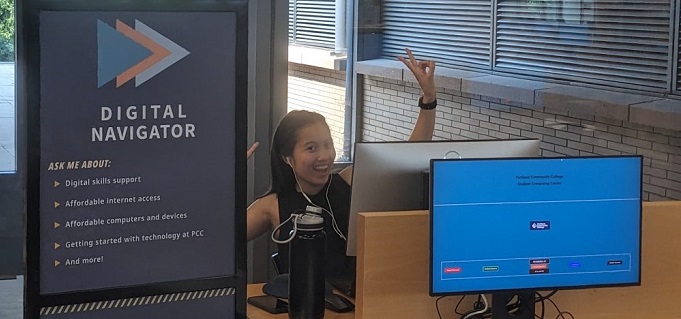Digital navigators ensure digital inclusion
By Misty Bouse
October 24, 2023
Portland Community College (PCC) has recently welcomed 14 digital navigators to facilitate greater technological accessibility for its students.
A digital navigator serves as a specialized guide focused on helping individuals bridge their digital skills gaps and achieve greater confidence in the use of technology. Situated within the PCC libraries and tutoring centers, these professionals are tasked with overseeing a comprehensive digital inclusion agenda.
Their scope of services ranges from facilitating home internet connectivity and identifying affordable computing devices, to enhancing students’ overall digital literacy. This program represents a committed step towards ensuring that every student and community member has equitable access to technology and the skills needed to use it effectively.
This is part of a larger, national effort to ensure equity in addressing the technology needs of underserved populations.
“Digital literacy is an essential, basic need on par with food and housing,” said Carey Larson, who runs the PCC Digital Literacy Program. “It’s often impossible to function as a citizen without basic digital skills and online access. Both are required to apply for benefits, file taxes, engage with health care services, take classes, and more. Many social services and community resources that were previously available in person are now primarily or exclusively accessed online, leading to increased barriers for those with underdeveloped digital skills.
“Digital Navigators address this problem by serving as peer guides who build relationships through repeated interactions — working side-by-side with the clients they serve, facilitating access to resources and offering one-on-one training,” she added.
The digital navigators are tech savvy PCC students who are often enrolled in cyber security, computer information systems (CIS), or related programs. This Title III grant-funded program provides a peer-to-peer gateway to the digital world. Their services include ongoing assistance with affordable internet access, device acquisition, technical skills, and application support.
Digital navigator James Kinder who is a second-year student in CIS at the Sylvania Campus believes that this is the ideal role for him. His early background of growing up in poverty in Kansas empowered him to be both resourceful and empathetic.
By 13, he learned to reconfigure old computer parts into a usable personal computer. Besides being a hardware wizard, Kinder says working as a digital navigator synthesizes his personal interests in tutoring and guiding people’s knowledge of tech.
“Whether you speak English or not, I can help you using an onscreen translator,” said Kinder who often tutors students from English for Speakers of Other Languages (ESOL). All are welcome. There’s no judgment, everyone has a different scope of knowledge with blind spots – and everyone learns differently. Why spend hours on your own when you could spend a few minutes with a digital navigator?”
He adds, “Efficiency is a big part of my ethos, afterall, we have but a limited lifespan. So, why waste time? Just ask for help and receive it. It’s free!”
This article originally was posted here.



